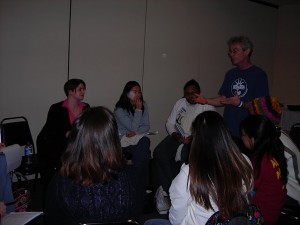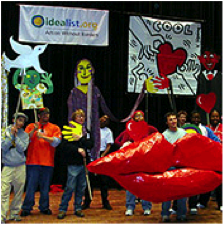The IMPACT National Conference is historically the largest national gathering of student leaders, administrators, faculty, and nonprofit staff committed to engaging college students in service, activism, politics, advocacy, and other socially responsible work. This annual conference builds on the legacy of the student service and civic engagement movement. The IMPACT National Conference, Inc. builds on the foundations of the Collegiate Outreach Opportunity League (COOL) and Idealist on Campus who both hosted annual national conferences for students engaged in community service and civic engagement spanning an incredible history of over three decades.
Founded in 1984, the Campus Outreach Opportunity League (COOL) was one of the first national organizations to promote and support college student involvement in thoughtful community service and civic engagement. Wayne Meisel, a recent Harvard graduate at the time, was bothered by characterizations of students as apathetic, lazy, and uncaring. This was not his experience having successfully created a number of community service initiatives at Harvard.
Meisel’s insight was that there is a distinction between personal apathy and structural apathy. Personal apathy is when individuals do not care and are unwilling to be involved. Structural apathy occurs because individuals are unaware of meaningful opportunities and are not asked to serve. Wayne felt that there was a need for an organization that could help campuses to better develop the structures and opportunities that would entice and engage students to become involved. In 1984, Meisel started the COOL initiative with a “Walk for Action” in which he walked from Maine to Washington D.C. visiting over 70 college campuses. Meisel wore a white jumpsuit that became a characteristic symbol of his journey and the national student movement building with him.
As the service and civic engagement movement continued to grow, various campuses began investing in the growth of community service and service-learning. Nationwide the movement saw the creation of organizations such as Campus Compact (started in 1985) and Youth Service America (started in 1986). By 1987, COOL was working with over 450 institutions of higher education. Early on, COOL developed model programs, resources, curriculum, and strategies to encourage service on campus. The largest undertaking of COOL was to organize a conference each year that would bring together students from across the country who were involved in their communities and who wanted to network with other students. The COOL Conference started with just a few hundred students at Harvard, and grew to bring together over 1,000 students each year.
In 2003, Action Without Borders/Idealist.org acquired COOL and continued its programs as the Idealist On Campus program. From 2003-2007, the staff of Idealist On Campus coordinated an advisory board lead by Heather Cronk and Trish Tchume and including Hunter Phillips Goodman, Amanda Buberger, Steve Janowiak, Char Gray, Cathy Lechowicz, and others over 4 years to organize an annual student conference, the COOL Idealist National Conference and, subsequently, the Idealist Campus Conference, building on the COOL legacy by providing meaningful and often life-changing experiences for conference attendees.
The conference program included 150 workshops, affinity groups, panels, poster sessions, and forums covering a diverse array of topics in service-learning, student service, leadership, and civic engagement and drawing upon the vast expertise of conference attendees.
After the 2007 Idealist Campus Conference, Action Without Borders announced that it was interested in passing the conference on to another group of organizers. Six alumni of the COOL Idealist Campus Conference working in higher education and the nonprofit sector gathered together as a Planning Committee to organize the conference collaboratively and on an entirely volunteer basis and became the IMPACT Founders. These 6 founders – Abby Kiesa, Heather Cronk, Ariane Hoy, Hunter Phillips Goodman, Steve Janowiak, and John Sarvey – were dedicated to building and supporting a national student movement to effect social change with an emphasis on a continuum of service, action, and advocacy in civic engagement. Youth Service America (YSA), a national youth service organization and original partner of COOL, agreed to serve as the fiscal sponsor for the conference.
Northeastern University served as the host campus for the first conference reconstituted as the IMPACT National Student Conference on Service, Advocacy, and Social Action in 2008 and was completely run by its 6 volunteer founders.. Although under a new name and with a different planning method, organizers were able to continue the tradition and drew over 900 participants. With the continued volunteer efforts of a newly developed national planning committee, and the creation of the Board of Directors, the IMPACT National Conference has continued to meet the goals Wayne Meisel set back in 1984, by promoting and supporting college student involvement in thoughtful community service and civic engagement.
The IMPACT Conference is a key component of the national student service movement. The movement is built by the passion, action, and connectivity of students young and old, who are passionate about the role students can play in service, action, and advocacy.
List of Past Conferences
Past conferences have taken place at the following campuses:
As the IMPACT Conference:
- 2024: Stephen F. Austin State University — Nacogdoches, Texas
- 2023: University of Massachusetts — Amherst, Massachusetts
- 2022: Virtual Conference — Online
- 2021: Virtual Conference — Online
- 2020: Arizona State University — Tempe, Arizona
- 2019: Madison House and University of Virginia — Charlottesville, Virginia
- 2018: University of Dayton — Dayton, Ohio
- 2017: Washington University in Saint Louis — St. Louis, Missouri
- 2016: University of Massachusetts — Amherst, Massachusetts
- 2015: Loyola Marymount University — Los Angeles, California
- 2014: Valparaiso University — Valparaiso, Indiana
- 2013: University of New Mexico — Albuquerque, New Mexico
- 2012: Stetson University — DeLand, Florida
- 2011: Stetson University — DeLand, Florida
- 2010: Clinton School of Public Service and University of Arkansas at Little Rock— Little Rock, Arkansas
- 2009: University of Maryland University College — Adelphi, Maryland
- 2008: Northeastern University — Boston, Massachusetts
As part of idealist.org/Action without Borders:
- 2007: DePaul University — Chicago, Illinois
- 2006: Vanderbilt University — Nashville, Tennessee
- 2005: University of California-Berkeley — Berkeley, California
- 2004: University of Pennsylvania — Philadelphia, Pennsylvania
As part of the Campus Outreach Opportunity League:
- 2003: Cleveland State University — Cleveland, Ohio
- 2002: Morehouse College — Atlanta, Georgia
- 2001: Harvard University — Cambridge, Massachusetts
- 2000: Saint Anselm College — Manchester, New Hampshire
- 1999: University of Utah — Salt Lake City, Utah
- 1998: University of South Carolina — Columbia, South Carolina
- 1997: Case Western Reserve University — Cleveland, Ohio
- 1996: George Washington University — Washington, DC
- 1995: Arizona State University — Tempe, Arizona
- 1994: University of Massachusetts — Boston, Massachusetts
- 1993: University of Illinois, Urbana-Champaign — Urbana-Champaign, Illinois
- 1992: Rollins College, University of Central Florida, Valencia Community College — Orlando, Florida
- 1991: Dillard University, Tulane University, Xavier University, SUNO, others — New Orleans, Louisiana
- 1990: University of California, Los Angeles — Los Angeles, California
- 1989: Fordham University — Bronx, New York
- 1988: Stanford University — Palo Alto, California
- 1987: Georgetown University — Washington, DC
- 1986: Brown University — Providence, Rhode Island
- 1985: Harvard University — Cambridge, Massachusetts


